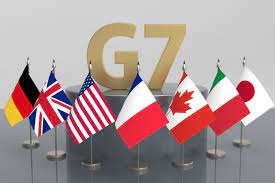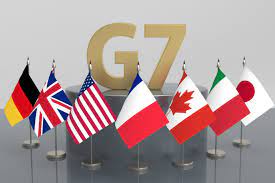
A draft declaration showed that the Group of Seven finance leaders agreed on Thursday to provide $18.4 billion to help Ukraine pay its debts in the coming months, and that they were willing to stay with Kyiv throughout the war with Russia and provide more if necessary.
Finance ministers and central bank governors from the United States, Japan, Canada, the United Kingdom, Germany, France, and Italy (the G7) are meeting to discuss the situation in Ukraine, which was invaded by Russia on February 24 and is running out of cash.
"By 2022, we will have mobilised $18.4 billion in budget support, including $9.2 billion in recent agreements," according to a draught communique as reported in the media.
"We will continue to stand by Ukraine throughout this war and beyond and are prepared to do more as needed," it said.
The G7 welcomed the European Commission's proposal to lend Ukraine 9 billion euros on Wednesday, noting that the European Bank for Reconstruction and Development and the International Financial Corporation planned $3.4 billion in help. However, it remained unclear whether these monies were included in the $18.4 billion or were independent.
German Finance Minister Christian Lindner announced earlier on Thursday that Germany would lend Ukraine 1 billion euros, and Japan vowed to raise its aid to Ukraine to $600 million to help it meet its immediate requirements.
Despite the daily destruction done by Russia, Ukraine believes that it requires $5 billion per month to keep public employees' salaries paid and the administration running.
The war has forced Western powers to reconsider decades-old relationships with Russia, not just in terms of security, but also in terms of oil, food, and global supply alliances ranging from microchips to rare earths.
More broadly, G7 policymakers are grappling with how to keep inflation under control while increasing sanctions pressure on Russia without creating a recession.
Stagflation, the dreaded 1970s mix of continuous price hikes and economic stagnation, has been mentioned by an increasing number of politicians. continue reading
"G7 central banks are closely monitoring the impact of price pressures on inflation expectations and will continue to appropriately calibrate the pace of monetary policy tightening in a data-dependent and clearly communicated manner, ensuring that inflation expectations remain well anchored, while being mindful to safeguard the recovery and limit negative cross-country spillovers," the draft said.
On Wednesday, the European Commission recommended creating a fund for Ukraine with an undefined amount of grants and loans, maybe jointly borrowed by the EU, to finance for post-war reconstruction.
The G7 expressed their support but did not go into depth.
"We call on all partners to join us in supporting Ukraine´s long-term recovery and to ensure the massive joint effort for reconstruction is closely coordinated, including with the Ukrainian authorities and international financial institutions," the draft said.
According to predictions of economists about the cost of rebuilding Ukraine, the amount of money required would range from 500 billion euros to 2 trillion euros ($524 billion to $2.09 trillion), depending on the length of the battle and the extent of the damage.
With such large sums at stake, the EU is considering not just a new cooperative borrowing project modelled after the pandemic recovery fund, but also seizing Russia's now-frozen assets in the EU as a source of funding.
Some countries, such as Germany, argue that the proposal, while politically appealing, would be legally problematic, and the G7 draught communique did not address the subject.
(Source:www.news18.com)
Finance ministers and central bank governors from the United States, Japan, Canada, the United Kingdom, Germany, France, and Italy (the G7) are meeting to discuss the situation in Ukraine, which was invaded by Russia on February 24 and is running out of cash.
"By 2022, we will have mobilised $18.4 billion in budget support, including $9.2 billion in recent agreements," according to a draught communique as reported in the media.
"We will continue to stand by Ukraine throughout this war and beyond and are prepared to do more as needed," it said.
The G7 welcomed the European Commission's proposal to lend Ukraine 9 billion euros on Wednesday, noting that the European Bank for Reconstruction and Development and the International Financial Corporation planned $3.4 billion in help. However, it remained unclear whether these monies were included in the $18.4 billion or were independent.
German Finance Minister Christian Lindner announced earlier on Thursday that Germany would lend Ukraine 1 billion euros, and Japan vowed to raise its aid to Ukraine to $600 million to help it meet its immediate requirements.
Despite the daily destruction done by Russia, Ukraine believes that it requires $5 billion per month to keep public employees' salaries paid and the administration running.
The war has forced Western powers to reconsider decades-old relationships with Russia, not just in terms of security, but also in terms of oil, food, and global supply alliances ranging from microchips to rare earths.
More broadly, G7 policymakers are grappling with how to keep inflation under control while increasing sanctions pressure on Russia without creating a recession.
Stagflation, the dreaded 1970s mix of continuous price hikes and economic stagnation, has been mentioned by an increasing number of politicians. continue reading
"G7 central banks are closely monitoring the impact of price pressures on inflation expectations and will continue to appropriately calibrate the pace of monetary policy tightening in a data-dependent and clearly communicated manner, ensuring that inflation expectations remain well anchored, while being mindful to safeguard the recovery and limit negative cross-country spillovers," the draft said.
On Wednesday, the European Commission recommended creating a fund for Ukraine with an undefined amount of grants and loans, maybe jointly borrowed by the EU, to finance for post-war reconstruction.
The G7 expressed their support but did not go into depth.
"We call on all partners to join us in supporting Ukraine´s long-term recovery and to ensure the massive joint effort for reconstruction is closely coordinated, including with the Ukrainian authorities and international financial institutions," the draft said.
According to predictions of economists about the cost of rebuilding Ukraine, the amount of money required would range from 500 billion euros to 2 trillion euros ($524 billion to $2.09 trillion), depending on the length of the battle and the extent of the damage.
With such large sums at stake, the EU is considering not just a new cooperative borrowing project modelled after the pandemic recovery fund, but also seizing Russia's now-frozen assets in the EU as a source of funding.
Some countries, such as Germany, argue that the proposal, while politically appealing, would be legally problematic, and the G7 draught communique did not address the subject.
(Source:www.news18.com)





